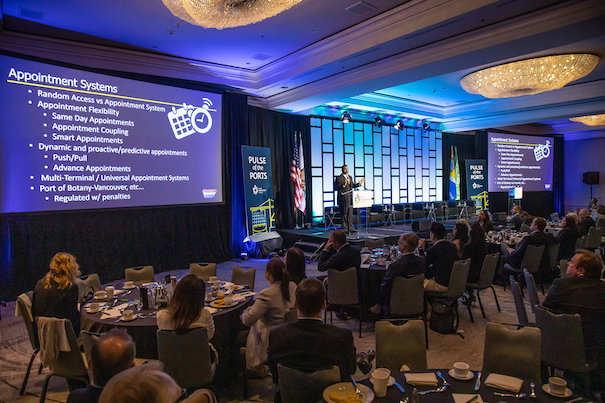A slowing domestic economy will likely lead to a moderate uptick in container imports through 2019, following a robust year that was marked by record-high cargo growth amid a trade dispute with China, experts said Wednesday at the Port of Long Beach’s 15th annual Pulse of the Ports Peak Season Forecast.

About 500 people gathered at the Renaissance Long Beach Hotel for the event, which brought together a panel of experts from every segment of the shipping and goods movement industry to discuss the cargo outlook for 2019, the latest economic trends and their effects on the San Pedro Bay port complex.
North American imports are projected to grow a modest 1.8 percent in 2019, demonstrating a significant slowdown from the 6.1 percent increase reported for U.S. imports last year, said Melissa Peralta, senior economist and forecaster for TTX, a railcar pooling company based in Chicago.
Retailers are expected to pump the brakes on imports during the first half of 2019, primarily because many companies rushed shipments in order to avoid a tariff hike that was supposed to be implemented in late 2018 and then early 2019, but never materialized, Peralta said.
Imports will be further impacted during the second half of the year in response to a sluggish U.S. economy as the initial effects of the federal Tax Cuts and Jobs Act of 2017 start to fade, Peralta said. She also estimated the overall U.S. economy will expand 2.7 percent this year.
“Economic fundamentals should continue to be supportive into 2019, albeit at a moderating pace,” Peralta said. “But imports may struggle to keep pace with overall economic growth due to an overhang of freight delivered in late 2018.”
Peralta also noted that Long Beach and other West Coast ports might benefit from the International Maritime Organization’s requirement that container ships reduce the sulfur content of vessel fuel from 3.5 percent to 0.5 percent starting on Jan. 1, 2020.
Although Asian imports have steadily climbed over the past decade at East Coast ports, Peralta said that increased costs associated with the new fuel regulations could drive shippers back to shorter routes leading to West Coast ports.
“With today’s program, Pulse of the Ports has again proven to be a valuable source of information for the entire industry, and the Board of Harbor Commissioners is pleased to have the Port host this annual event,” said Long Beach Harbor Commission President Tracy Egoscue.
“Our team will continue to move forward with our capital improvement plan of action to further operational excellence as we plan for growth in the long run,” said Port of Long Beach Executive Director Mario Cordero. “We invest in our Port, allowing us to move cargo faster, more reliably and more sustainably than the competition.”
In addition to Peralta, panelists at the 2019 Pulse of the Ports included Elena Asher, Assistant Director – Export Logistics, Dairy Farmers of America; Benjamin Conwell, Senior Managing Director – Americas Leader, newCommerce Advisory Group, Logistics & Industrial Services, Cushman & Wakefield; Allen Clifford, Executive Vice President, Mediterranean Shipping Co.; Sal Ferrigno, Vice President, SSA Marine; Hasan Hyder, General Director International Intermodal, Union Pacific Railroad; Robert Loya, Vice President, CMI West at CMI Transportation Inc.; and panel moderator Bill Mongelluzzo, Senior Editor, IHS Maritime & Trade.








